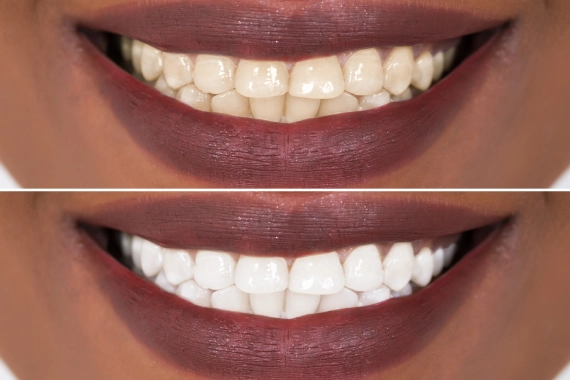How Long Does Teeth Whitening Last?
Teeth whitening has become popular as people are searching for ways to enhance their smiles and boost their confidence. Whether done professionally or using over-the-counter products, teeth whitening can effectively remove stains and discoloration, leaving teeth looking brighter and healthier. However, one common question that arises is, “How long does teeth whitening last?”
About 40% of adults in America deal with yellow teeth, prompting them to seek teeth-whitening solutions for a brighter smile. White teeth enhance confidence and contribute to feeling more at ease in social settings.
Let us explore the factors influencing the duration of teeth whitening and provide insights into prolonging its effects.

Understanding Teeth Whitening
Teeth whitening is a dental treatment aimed at brightening the shade of teeth and removing stains and discoloration. The process involves the use of bleaching agents, like hydrogen peroxide or carbamide peroxide, that penetrate the enamel to break apart stains and lighten the color of the teeth.
Factors Influencing Whitening Duration
Several factors affect how long the results of a teeth whitening treatment last. These include:
- Treatment Method: The method used for teeth whitening can impact its longevity. Professional treatments performed by dentists often yield longer-lasting results compared to over-the-counter products.
- Lifestyle Habits: Lifestyle habits, such as smoking, consuming dark-colored foods and beverages, and poor dental hygiene practices, can contribute to the re-staining of teeth after whitening treatments.
- Enamel Thickness: The thickness of the tooth enamel plays a role in how long teeth whitening results last. Thicker enamel may retain the whitening effects for a longer period compared to thinner enamel.
- Maintenance: Proper maintenance following a teeth whitening treatment can help prolong its effects. Regular brushing, flossing, and dental check-ups can prevent stains from reoccurring and maintain the brightness of the teeth.
Types of Teeth Whitening Methods
Several types of teeth whitening methods are available, each offering unique benefits and considerations.
In-Office Professional Teeth Whitening:
A dentist performs in-office professional teeth whitening in a clinical setting. This technique includes using a high-concentration whitening gel that contains hydrogen peroxide or carbamide peroxide. The dentist may use special light or laser technology to activate the whitening gel and accelerate bleaching. In-office whitening treatments offer fast and dramatic results, often in just one appointment.
Take-Home Professional Whitening Kits:
Dentists provide take-home professional whitening kits for at-home use. These kits include custom-made trays that fit the patient’s teeth perfectly. Patients are advised to fill the trays with a whitening gel and wear it for a certain amount of time each day. While take-home kits may take more time to get the desired results compared to in-office treatments, they provide convenience and flexibility, allowing patients to whiten their teeth at their own pace.
Over-the-Counter Whitening Products:
Over-the-counter whitening products are readily available at pharmacies and grocery stores without a prescription. These products include whitening toothpaste, strips, and pre-filled gel trays. While these options are more affordable and convenient, they contain lower concentrations of whitening agents and may produce less noticeable results compared to professional treatments. Additionally, some individuals may experience increased tooth sensitivity or gum irritation with over-the-counter products.
Natural Remedies:
Some individuals opt for natural remedies to whiten their teeth, such as baking soda, activated charcoal, and hydrogen peroxide solutions. While these methods may effectively remove surface stains, they may also pose risks, such as enamel erosion and gum irritation, if used incorrectly or excessively. It’s essential to consult with a dentist before trying natural whitening remedies to ensure safety and effectiveness.
Porcelain Veneers:
Porcelain veneers are thin shells of porcelain specially made to fit over the front surface of teeth. While not a traditional whitening method, veneers can effectively conceal stains, discoloration, and other cosmetic imperfections, providing a permanently brighter and uniform appearance to the smile. Veneers are a long-lasting solution but require permanent alteration of the tooth structure and are more invasive and costly compared to other whitening options.
Maintaining Whitening Results
To prolong the results of a teeth whitening treatment, individuals should adopt healthy oral hygiene habits and make lifestyle changes, such as:
- Avoid tobacco products and limit consumption of stain-causing foods and beverages.
- Practicing good oral hygiene, including brushing teeth twice a day, flossing daily, and using mouthwash.
- Scheduling regular dental cleanings and check-ups to remove plaque and tartar buildup and address any oral health issues.
Conclusion
How long does teeth whitening last?” is a question many individuals think about when considering whitening treatments. While the duration of teeth whitening results may vary depending on factors such as lifestyle, oral hygiene practices, and the type of treatment used, professional teeth whitening offers longer-lasting and more noticeable results compared to over-the-counter products.
By choosing Prime Family Dentistry in Stone Ridge, VA, you can benefit from expert care and personalized treatment options. Don’t wait any longer to achieve a brighter, more confident smile – book an online appointment today! New patients can call us at (703) 214-9126, while all other callers can reach us at (703) 957-3536.
FAQ
How long does teeth whitening last?
The duration of teeth whitening results depends from person to person, but professional treatments can last anywhere from six months to several years with proper maintenance.
Can I maintain teeth whitening results at home?
Maintaining teeth whitening results at home is possible by practicing good oral hygiene, avoiding staining foods and drinks, and using whitening toothpaste or touch-up treatments recommended by your dentist.
Are there any side effects associated with teeth whitening?
While teeth whitening is generally safe, some individuals may experience temporary tooth sensitivity or gum irritation. These side effects typically subside shortly after treatment.

